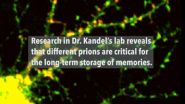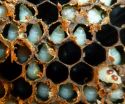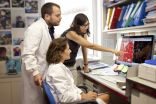(Press-News.org) Hamilton, ON (July 2, 2015) - Two new studies led by researchers from the Farncombe Family Digestive Health Research Institute at McMaster University show that transplantation of fecal matter may be a useful tool in the fight against ulcerative colitis (UC).
Ulcerative colitis is a chronic, debilitating inflammatory bowel condition characterized by symptoms including bloody stools, diarrhea, abdominal pain, weight loss and malnutrition. It results from the development of abnormal immune responses to the normal bacteria in the digestive tract. It is difficult to treat and standard therapy doesn't always work.
There is currently great interest in treating UC with fecal microbiota transplantation (FMT), which involves transplanting gut fecal bacteria from healthy people into patients with UC.
A study recently published in Inflammatory Bowel Diseases found that UC can be controlled by the type of bacteria that inhabits the gut. The study was led by Elena Verdu, an associate professor of medicine with the Michael G. DeGroote School of Medicine.
"Our animal research provides insight that selected bacterial groups, involved in gut health, are important for protecting the colon against injury and inflammation," said Verdu.
Along the same theme, in research published on June 29, 2015 in Gastroenterology, professor of medicine Paul Moayyedi and his team explored the safety and efficacy of FMT by conducting a placebo-controlled, randomized trial. They found that "FMT induces remission in a significantly greater percentage of patients with active UC than placebo," the authors wrote.
"Our study in patients with ulcerative colitis is the first randomized trial of fecal microbiota transplantation in adults with ulcerative colitis and shows that this therapy may work," said Moayyedi. "The effect of fecal transplant seems to be dependent on the sort of bacteria that is in the donor stool, which fits with the observations of Dr. Verdu's animal study."
In Verdu's study, mice were given gut bacteria from patients with severe UC and the effects were compared to those produced in mice that were given bacteria from a healthy person. The results identified a reduced amount of the bacterial families that are important for gut health in the feces of patients with severe colitis.
Second, they found that when mice were given these bacteria and then exposed to a toxin that causes gut injury, the resulting inflammation was higher in the mice with UC bacteria than in mice with bacteria from the healthy person, in whom the beneficial bacterial groups were abundant.
"The study also showed that the same protective effect could be achieved using the fecal material from the healthy person as with specific groups of bacteria that were isolated from the 'healthy' fecal matter," said Verdu. "This suggests that specific combinations of beneficial bacteria extracted from healthy people could be tested in future clinical fecal transplantation studies, and could potentially replace fecal matter."
Verdu said the implications of her study relate to the selection of healthy donors for fecal transplantation.
"In addition to screening for infections and disease, donors that harbour an abundance of the beneficial bacterial groups identified in our study could be selected to increase the chances of success of transplantation," said Verdu.
Moayyedi and his team, including McMaster professors Michael Surette and Christine Lee, recruited 75 patients with a flare up of their UC and randomized them to fecal transplant therapy given as an enema derived from stool donated by an anonymous healthy donor once per week for six weeks, or a placebo consisting of a water enema. They found 24 per cent were in remission in the fecal transplant group compared to five per cent in the placebo group. There were two main healthy donors, donor A and donor B - one of which was the healthy donor from Verdu's mouse study - and benefit seemed to be mostly related to those that received stool from donor B. The effect was also greater in those that had recently been diagnosed with UC.
"Many questions remain, but this provides interesting data suggesting that altering the gut microbial flora may be promising for treating ulcerative colitis," the authors noted.
Moayyedi added that the data suggests more research is needed using the FMT approach.
INFORMATION:
Verdu's study received funding from the Crohn's and Colitis Foundation of Canada. Moayyedi's research was supported by the Hamilton Academic Health Sciences Organization and Crohn's and Colitis Canada.
For more information:
Veronica McGuire
Media Relations
Faculty of Health Sciences
McMaster University
vmcguir@mcmaster.ca
905-525-9140, ext. 22169
NEW YORK, NY (July 2, 2015)--Research from Eric Kandel's lab at Columbia University Medical Center (CUMC) has uncovered further evidence of a system in the brain that persistently maintains memories for long periods of time. And paradoxically, it works in the same way as mechanisms that cause mad cow disease, kuru, and other degenerative brain diseases.
In four papers published in Neuron and Cell Reports, Dr. Kandel's laboratory show how prion-like proteins - similar to the prions behind mad cow disease in cattle and Creutzfeld-Jakob disease in humans - are critical ...
Think you're a foodie? Adventurous eaters, known as "foodies," are often associated with indulgence and excess. However, a new Cornell Food and Brand Lab study shows just the opposite -adventurous eaters weigh less and may be healthier than their less-adventurous counterparts.
The nationwide U.S. survey of 502 women showed that those who had eaten the widest variety of uncommon foods -- including seitan, beef tongue, Kimchi, rabbit, and polenta-- also rated themselves as healthier eaters, more physically active, and more concerned with the healthfulness of their food ...
An infestation of speck-sized Varroa destructor mites can wipe out an entire colony of honey bees in 2-3 years if left untreated. Pesticides help beekeepers rid their hives of these parasitic arthropods, which feed on the blood-like liquid inside of their hosts and lay their eggs on larvae, but mite populations become resistant to the chemicals over time.
While exploring plant-based alternatives to control Varroa mites, Chinese bioagricultural and Japanese cell physiological labs saw that certain tick repellents repress mites from finding their honey bee hosts. In a ...
To observe the brain in action, scientists and physicians use imaging techniques, among which functional magnetic resonance imaging (fMRI) is the best known. These techniques are not based on direct observations of electric impulses from activated neurons, but on one of their consequences. Indeed, this stimulation triggers physiological modifications in the activated cerebral region, changes that become visible by imaging. Until now, it was believed that these differences were only due to modifications of the blood influx towards the cells. By using intrinsic optical signals ...
Healthy people given the serotonin-enhancing antidepressant citalopram were willing to pay almost twice as much to prevent harm to themselves or others than those given placebo drugs in a moral decision-making experiment at UCL. In contrast, the dopamine-boosting Parkinson's drug levodopa made healthy people more selfish, eliminating an altruistic tendency to prefer harming themselves over others. The study was a double-blind randomised controlled trial and the results are published in Current Biology.
The research provides insight into the neural basis of clinical disorders ...
BETHESDA, MD - The American Society of Human Genetics (ASHG) Workgroup on Pediatric Genetic and Genomic Testing has issued a position statement on Points to Consider: Ethical, Legal, and Psychosocial Implications of Genetic Testing in Children and Adolescents. Published today in The American Journal of Human Genetics, the statement aims to guide approaches to genetic testing for children in the research and clinical contexts. It also serves as an update to the Society's 1995 statement of the same title, which was issued jointly with the American College of Medical Genetics.
"Twenty ...
Idiopathic pulmonary fibrosis (IPF) causes a gradual loss of respiratory capacity and can be lethal within a few years. The cause is unknown, although it can be attributed to a combination of genetics and the environment. A team of researchers from the Spanish National Cancer Research Centre (CNIO) have now discovered that telomeres, the structures that protect the chromosomes, are at the origin of pulmonary fibrosis. This is the first time that telomere damage has been identified as a cause of the disease. This finding opens up new avenues for the development of therapies ...
A mutation found in most melanomas rewires cancer cells' metabolism, making them dependent on a ketogenesis enzyme, researchers at Winship Cancer Institute of Emory University have discovered.
The finding points to possible strategies for countering resistance to existing drugs that target the B-raf V600E mutation, or potential alternatives to those drugs. It may also explain why the V600E mutation in particular is so common in melanomas.
The results are scheduled for publication in Molecular Cell.
The growth-promoting V600E mutation in the gene B-raf is present in ...
The first comprehensive analysis of the woolly mammoth genome reveals extensive genetic changes that allowed mammoths to adapt to life in the arctic. Mammoth genes that differed from their counterparts in elephants played roles in skin and hair development, fat metabolism, insulin signaling and numerous other traits. Genes linked to physical traits such as skull shape, small ears and short tails were also identified. As a test of function, a mammoth gene involved in temperature sensation was resurrected in the laboratory and its protein product characterized.
The study, ...
MAYWOOD, Ill. - New devices called stent retrievers are enabling physicians to benefit selected patients who suffer strokes caused by blood clots. The devices effectively stop strokes in their tracks.
For the first time, new guidelines from the American Heart Association/American Stroke Association recommend the treatment for carefully selected patients who are undergoing acute ischemic strokes and who meet certain other conditions.
Loyola University Medical Center stroke specialist Jose Biller, MD, is a member of the expert panel that wrote the guidelines, published ...



